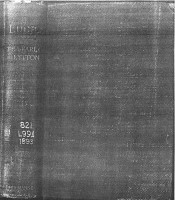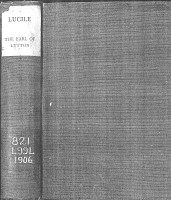PUBLISHER: Longmans, Green & Company, London, New York & Bombay, 1887-1961
ABOUT: Established at 15 East Sixteenth Street in New York in 1887 to distribute the titles of its London parent firm, founded by Thomas Longman in 1724. Charles J. Mills came from England in 1889 to manage the New York branch and was succeeded by his sons and grandsons until the firm was dissolved in 1961.... company published its own books... In 1895 Longmans, Green moved to 91-93 Fifth Avenue.... In 1910 the firm became a tenant of the new Dodd, Mead Building at 443-444 Fourth Avenue at Thirtieth Street. (DLB 49). Charles Mills opened New York branch 1875, converted to partnership 1889; before 1889 operated as distributing and importing agency for English office. (Brief Studies).
LUCILE’s ISSUED BY Longmans, Green & Company.
1890-1895 American Catalogue. New ed. '94. 12o. $3; 1902 United States Catalog. Lucile. $3.
This volume was one of a two volume Selected Works edited by Betty Balfour, Lytton's daughter; for her appraisal of her father's work, see her preface.
Illustrated London News (London, England),Saturday, January 13, 1894; pg. 43; Issue 2856 (352 words) LORD LYTTON’S - LUCILE. Lucile. By the Earl of Lytton, (London: Longmans, Green, and Co.)—The fundamental defects of the Earl of Lytton's "Lucile" were clearly perceived and frankly admitted by the author when he republished it. "The subject of it,” he says, “is fitter for prose than for verse. The whole conception is inconsistent with the permanent conditions of poetic beauty.” This is, unfortunately, true. "Lucile”' is a novel of modern society in verse. The mere circumstance of writing in verse implies that the author desires permanence for his labours; but if this is rarely attainable for the modern novel, even with the unrestricted liberty allowed by the conditions of prose composition, it is little likely to be so when the author has voluntarily subjected himself to trammels which must necessarily interfere with the freedom of plot and dialogue; and the subject-matter, moreover, if really true to modern manners, can but rarely possess the dignity and beauty which alone can justify the endeavour to invest it with poetic form. There remains one ground on which such a work, apart from the merit of isolated passages, may challenge admiration as a whole, as a brilliant tour de force. This "Lucile" certainly is: it probably has not now, and is not likely to have, any rival in the art of ordinary narrative. It could only have been composed by a man gifted with an extraordinary faculty of language; a man, too, endowed with wit, fancy, an intimate acquaintance with life and manners, and ideal aspirations transcending anything that his actual circumstances could offer him. It is the poetical epic of modern society had been a possibility, Lord Lytton would have achieved it; as it is, he has bequeathed the world in "Lucile" a striking evidence of his own talent; a seasonable admonition to other poetical architects to consider the foundations before beginning the edifice; and a number of beautiful passages, pathetic, humorous, or descriptive, which palliate and colour, though they cannot redeem, the original sin of experimenting in an illegitimate kind of literature. -------R[ichard] Garnett
New York Times; April 21, 1894, p. 3. PUBLICATIONS OF THE PRESENT WEEK: Notes on the More Interesting and Important Ones. —Longmans, Green & Co. have ready a new edition of the Earl of Lytton's "Lucile" and one of his selected poems. They have given to the former the preface of the Collected Edition, which was the third edition of "Lucile," wherein verses almost unconsciously reproduced by the poet from Alfred de Musset's works were expunged. They have given to the volume of "Selected Poems" the advantage of an interesting introduction by Betty Balfour, the poet's daughter. She explains again how it happened that unfriendly critics seemed justified in charging plagiarism of "Luclle" from George Sand's "Lavlnia," and aptly says, in a sketch of the author's life and works, that, "had the rival calls of his many-sided intellect been at variance, the poet in my father would always have had the preference." Among the hitherto unpublished lyrics in the volume, the last, "The Prisoner of Provence," Is founded on the version of the story of the Man With the Iron Mask which makes him the twin brother of Louis XIV. It Is particularly interesting as expressive of the poet's disappointment at the circumstance that to, him celebrity and success had come in diplomatic and social affairs and "had been scantiest in the quarter from which he coveted them most," as 'his daughter says. The two volumes, uniform in size and typography, are well printed.
The Dial 16:#191 (June 1, 1894) p338, "Briefer Mention. A new edition of "Owen Meredith's" Lucile, and a selection from his poems by Lady Betty Balfour, have been published in two handsome and uniform volumes (Longmans). The Lucile includes the preface to the third edition, in which the author defended himself against the charge of plagiarism. The other volume has a lengthy introduction by Lady Balfour. She gives us selections from all of her father's books except The Wanderer (which has been republished in a volume by itself), Orval (which no one cares to remember), Marah, and King Poppy. There are also a few hitherto unpublished poems.
The Literary World, June 30, 1894, p203. Of a new edition of Owen Meredith's poems we have received Lucile and Selected Poems, bound in claret cloth and excellently printed. Mrs. Balfour, the poet's daughter, has made the selection, and explains its plan in her modest introduction. She accounts for the comparative unpopularity of her father's verse, with the exception of Lucile, thus: 'Circumstances, in some respects, were against him. For the larger part of his life he was an exile. Neither books, periodicals, nor reflection on his art could supply the place of direct intercourse with the representatives, few or many, of that outer circle to which he addressed himself.... On his return from exile his own contemporaries had in large measure passed away, and he failed to gain touch with the spirit of a younger age.' -- Longmans, Green & Co.
Atlantic Monthly 74:706 (November 1894), “Comment on New Books”: Poetry and the Drama. We have received from Longmans new editions of Owen Meredith's Lucile, The Wanderer, and Selected Poems. In an Introduction to this last volume, the author’s daughter, Lady Betty Balfour, writes with discrimination of her father's work, but does not help matters at this late day by giving the reasons for the failure of successive volumes to capture either the public or the critics. No such apology would have been needed had Lord Lytton put into much of his verse the directness and grasp that mark such a poem, for example, as Twins, unpublished before the appearance of these Selected Poems. The text of The Wanderer follows that of the first edition, 1857; and wise it was to discard the changes by which the author, in later life, sought to make these poems of youth conform with the thoughts of middle age. Lucile, even in new dress, strikes the pathetic note of a song that is no longer sung. What sadder fate is there than that which overtakes sheet music that is turning yellow without winning the dues of lovely old age!
1893 PTLA: [Lucile is offered as are several other Meredith works]. Cf. British Library Catalogue BL 011652.g.5, New edition, 333p.
----. 1893. 19cm, 333p. Tan cloth stamped gold. University of Michigan.
----, 1893. 186mm, 333p. Plum buckram, spine title gold. Contains the later apologetic preface rather than dedication. University of Texas, Austin.

----. 1893: WorldCat reports copies with OCLC #37865295 at the University of Colorado; University of Michigan; Princeton; University of Texas Austin; Cambridge; and the National Library of Scotland; plus copies with OCLC #271710030 at New South Wales and Queensland. The British Library reports a copy with System #002297187.
1894 PTLA: [as 1893, price] $3.00. [Also in "Selected List of Books Published During 1893:] Lucile. New Edition. Crown 8vo. $3.00.
1895-1905 PTLA: [As 1894, without "Selected List" notice].
1906: Longmans, Green, and Co., 39 Paternoster Row, 1906. 18cm, 333p. Titlepage reads: "New Edition" but left is a cancel suggesting it is a re-issue of 1894 sheets. Blue cloth with paper label on spine. University of North Carolina: NUC0594669. WorldCat reports copies with OCLC #39055483 at Univesity of North Carolina (copy above) and two copies in France: Charles de Gaulle and Lille.

1906-1910 PTLA: [Lucile and other titles dropped; only Marah retained].
Last revised: 21 July 2020